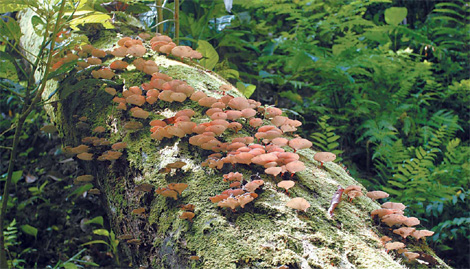Deep forest
|
|
|
Xishuangbanna, in Yunnan province, has plenty of virgin, old growth forest, where you can have an unforgettable experience of great natural beauty. Photos courtesy of CFP |
Get off the beaten track and hire a guide to take you through the pristine, old growth rainforest of Xishuangbanna, Yunnan province, Simon Lewis, says
Darkness was falling, we were alone in the forest and the fallen tree that served as a bridge over the swollen river had been swept away. We couldn't go back - we'd already walked 20 km through dense jungle - and going forward appeared to be a dubious proposition.
But Mr Rush, my indomitable guide, didn't give it a second thought.
"Just take off your shoes and jump," he said and dived in. The water foamed around his thighs as he waded ahead. I followed tentatively with shoes held above my head, shivering at the cold water and feeling the mud squelch between my toes. I tried not to think about the leeches and snakes we'd seen earlier.

"This is nothing," Rush said. "One time I came with two Dutch girls. The stream was so high we had to wait for some villagers to come along, and they pulled us all across with ropes."
This, I believed, was a cunning tactic. Whenever it looked like I might complain, he'd bring up some other tourist who had it worse. And I had no right to grumble, I had got what I had asked for - a real warts and all trip into China's biggest rainforest.
Xishuangbanna, in Yunnan province, has plenty of virgin, old growth forest; but you have to get out of the sleepy capital, Jinghong, and away from the touristy "forest parks" before you can really see it. And for that you'll need a guide.
Mr Rush really loves the forest. In his previous job as a beekeeper he had traveled with his hives to every province in China, and he had finally settled in Xishuangbanna because it had "the most magic".
Though he said he was given his English name because of his eagerness to learn the language in class, it seemed particularly appropriate as he sped down the narrow, overgrown forest trails, swinging a machete to clear the path.
Being inside the forest was a sublime experience. Every moment I was overwhelmed by a glut of visual detail, millions of leaves and tree trunks, all in the narrowest of palettes, green and brown.
Dazzling touches of color were provided by the iridescent wings of butterflies, which seemed to taunt and flirt, by staying just out of reach. The buzz of insects sounded like incessant ring tones. Exotic birds flashed by as the trees above cast shadows and pressed in from each side, as if to repair the red earth scar of our trail.
For hours, the only other sign of human activity was the occasional hole hacked into the bamboo, made by locals looking for tasty grubs to eat. It was only after fording the stream that we began to see signs of civilization.
We passed through a rubber plantation - narrow trees planted in rows - and there were bowls or broken bottles that collected the white sap.
Farming rubber is hard work - every day the trees have to be cut at 3 am. The locals don't like to do it and employ Sichuanese laborers. They peered out at us from simple bamboo huts. Here there were no birds, or butterflies and the only animals were long, bright red centipedes. Rubber trees take up so much water that nothing else grows around them.
Here Mr Rush seemed to walk even faster, it was obvious that he didn't like this monoculture. With the price of rubber rising, in recent years a lot of forest has been cleared for plantations. Fortunately, much of what remains is now protected.
"There is something very precious here and it needs to be protected. But the people also need to make a living. The challenge for China is to develop without destruction," Mr Rush said.
Finally, we arrived, in darkness, at a village. With no light pollution the stars shone brightly, seemingly close enough to touch. The locals walked around with torches strapped to their heads, resembling giant fireflies. They were chopping vegetables, cooking, putting children to sleep.
I had a cold shower then settled down to a simple meal around a hearth. I was so hungry that even a bowl of the aforementioned grubs was welcome. Actually, they were pretty tasty, a good meat substitute when fried in chili oil.
Lubricated with home-made baijiu, our host opened up. He said that in his younger days he would go hunting for wild pigs in the forest with a home-made gun. He told a story about a villager who, angry with an elephant for eating his rice, shot its calf. The angry elephant, so the story goes, charged the man's house and killed his wife.
Today there are few wild elephants left in the forest, in a nearby forest park.
My hosts were Jino, one of China's smallest ethnic groups, with only 20,000 members. You can distinguish them by the white headdresses of the women and the rising sun painted, for protection, on the eaves of their houses. Not far away were the jungle villages of Blang people, famous for their elaborate black headdresses; and Wa, whose women were easy to distinguish by their long hair.
"The cultures here are worth every effort to preserve," Mr Rush said.
As I lay down to sleep on a mat on the floor I thought about this unique face of China that Mr Rush had shown me. I promised myself I would return, though next time I'd bring some wellies.
Simon Lewis is the author of Rough Guide to China.

 0 Comments
0 Comments








Go to ForumComments